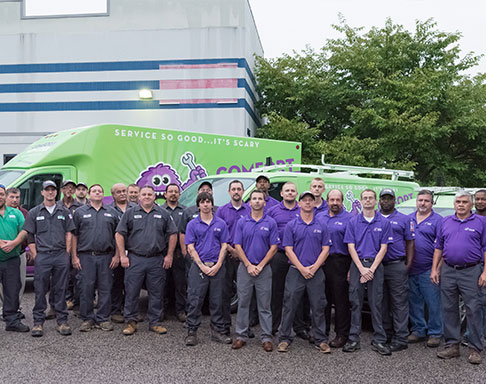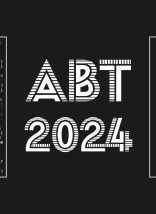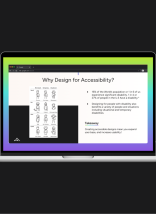The core values of The Entrepreneurs’ Organization (EO) are Boldly Go (bet on your own abilities), Thirst for Learning (be a student of opportunity), Make a Mark (leave a legacy), Trust and Respect (build a safe haven for learning and growth), and Cool (create, seek out and celebrate once-in-a-lifetime experiences).
Being thirsty for knowledge really resonates with me. From the day I started Atlantic BT to now, I didn’t want to be someone who waited to be told how to do something. The first time I went to an EO meeting, the other members were hungry for knowledge, eager to write down when a seminar was happening or what books they should read. Finding really successful people like these who shared this thirst opened a whole new chapter for me. I always try to share that knowledge and spirit here at ABT and inspire our management team to create that thirst for knowledge in our organization.
I really believe high-achieving humans distinguish themselves from having a thirst for knowledge and desire to put different ideas together. That drives human innovation. Our ability to access knowledge has never been better than it is right now. I love being able to share experiences with people from different situations. When we share what we’re dealing with in the group, we can all learn from it. In our EO forum, we’re very open to this kind of direct feedback.
Inspiration
What I enjoy the most is building things and making them better. There is a special sense of accomplishment when you create something that leaves a lasting impression. With Comfort Monster, being able to purchase a company and help it grow really meant a lot to me. You can look at something, have a vision for it, and keep pushing it toward something exceptional. At CM we have a long way to go, but we can continue to build momentum. This creates an engine that can run whether or not you’re applying that pressure.

At ABT I love having such a great team. We have a culture, an engine that runs well whether I’m in the office or not. I will apply some steering, but it would thrive whether or not I was here to provide direct input. Being able to see that momentum in action every day is definitely inspiring.
How to Face Challenges
Prioritization is your friend. It’s your job to break down larger goals into bite-sized pieces and make sure all of your resources are being used as effectively as possible. On any given day, you have hundreds of priorities. When you make the right decisions, your business does well. When you make the wrong decisions, you are slowing down your path to success.
Sometimes these priorities are clear. They jump out at you and you know what to do next. Sometimes you’re faced with lots of choices that all seem to be right (or wrong) with no clear frontrunner. These situations can be difficult. But at the end of the day, you have to make a decision and move forward. Not making a decision is often worse than making the wrong decision. In most cases you can go back and correct mistakes when you have more data.
The other challenge is that you can’t really have an “off” day. The people around you are depending on your energy and vision. An off day for you is amplified through the organization to your team. My theory is that you, the CEO, should have more energy than anyone else. If you make a mistake at this level, that’s a huge deal. This is why managing a small company effectively is HARDER than a large company because the smaller company really depends on your energy and leadership to keep momentum up. If you’ve got a big team, having a couple people be off course isn’t as big a deal—the engine will keep moving forward even if it could be more efficient.
Social Responsibility and Business Leadership
It’s now common to see companies come out and take a stand on social or political issues. This is a challenge because you’re tempted to use your company as a platform to influence others. This is why companies do this: you’ve got a captive base of people with a leadership chain in place and your influence is going to be magnified by that. Your customers are impacted in turn. This gets complicated because not everyone is going to agree with you.

I don’t want anyone to feel uncomfortable. I can have personal opinions and create a platform off the clock, but once I bring that into the workplace it’s almost guaranteed to make at least one person feel uncomfortable. If you lose even one person because of your political stance, that’s one person too many. But, if you look at it from a performance perspective, having uniformity within your culture will lead your company to under-perform. No one has any diverse opinions and then there is no room to grow, learn, or connect. Too political, and you’ll alienate people with different opinions. I want people who work with me to feel comfortable standing by their values.
Values in Action
I totally get why companies use their business as a platform. When the NC General Assembly passed HB2, I felt it was important for me to speak out against this law and any efforts to discriminate against citizens based on their sexual orientation or identity. I sent a company-wide email at ABT reaffirming that as a company, our job is to create a welcoming and inclusive environment. I told all of our employees that anyone of any faith, race, nationality, or sexual orientation was welcome at ABT, and that we’d make any necessary accommodation to help our employees succeed and help ABT succeed as a company. This stand of inclusiveness felt deeply important to me, so I made my opinions public to my company.
That said, I’ve always believed intimate impact is more important than sheer numbers. I’ve always been more of a quiet change kind of guy. My number one priority is creating a company culture where everyone enjoys working here. When I was young, I had several hourly jobs and I always felt like those days lasted an eternity. When I started ABT, one of the promises I made to myself is that we would create a culture where people enjoyed being at work so much they wouldn’t ever want to leave. It’s the responsibility of the company to create an environment that people feel is engaging, challenging, and meaningful. After all, think about how much of your waking life you spend at work!
How to Lead and Leave a Legacy
The most important thing to remember is that success is not going to happen over night. Keep going! Entrepreneurship is a journey. I remember one particular instance in my career. My first company was very young, we had 3–4 employees and a handful of customers. The work was hard, meeting payroll was hard, customers were hard to manage, and I was only paying myself the bare minimum to survive. I was sitting at a stoplight on my way to work and I thought to myself, “This sucks!” Then I thought “OK, if you don’t do this, what else do you want to do? Where would you rather work?” In that instance, I realized, there is nothing I would rather be doing. From that point on, the stress was my choice and there was nothing I’d rather do. It’s a big difference from finding yourself in a place you don’t to be.
So my advice is this. Keep going and never quit. Even if the worst happens and your business fails, learn something from it and try again. When it gets tough and you’re thinking about quitting, do what I did. Think about what you would rather be doing for work. Chances are if you’re meant to be an entrepreneur, there is nothing better than the pressure and the adventure of entrepreneurship. That realization alone will make your journey easier.









